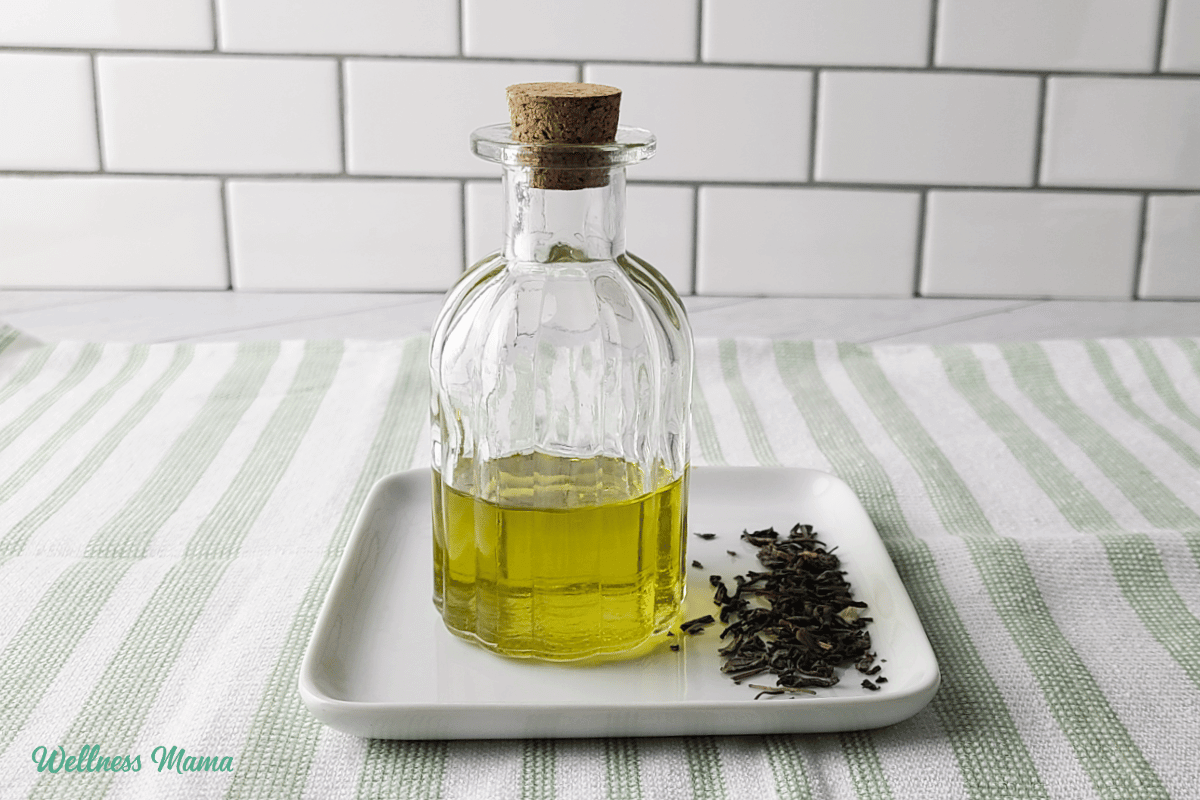Formally known as camellia sinensis, green tea is a great way to perk up tired skin. Camellia sinensis leaf extract is gaining popularity in toners, cleansers, and hydrating serums. While store-bought brands may give you that dewy look, I’m not a fan of some of the ingredients. Toxic parabens and retinol and tongue twisters like butylene glycol and ethylhexylglycerin to name a few.
Some green tea serums add ingredients like panthenol, squalane, allantoin, and peptides. These have their benefits but can be hard to source outside of a lab. This green tea serum uses simple, natural ingredients for an easy skincare DIY.
Green Tea Skin Benefits
Most of us know how healthy a cup of green tea can be, but it’s also great for our skin. Green tea is high in antioxidants and polyphenols like EGCG. These help protect against skin damage from UV rays and environmental pollution.
Green tea’s polyphenols also help restore the vitamin C our skin needs to make collagen. In this way it can help fight fine lines and improve firmness and skin tone. The properties in green tea help soothe irritation and skin redness and help calm inflammation.
Green tea also contains caffeine, which helps boost circulation to the skin. You’ll sometimes find caffeine in eye creams to reduce dark spots and undereye puffiness. Caffeine also helps reduce cellulite by breaking down fat molecules deep in the skin.
It’s important to note that using green tea topically on its own isn’t the best way to get in shape. Studies showing its cellulite benefits used high levels of caffeine. While green tea can help perk up skin, it’s still important to make healthy food choices.
Those dealing with acne or oily skin can also see benefits from adding green tea to their skincare routine. Not only does it reduce sebum, but it reduces inflammation and redness too.
Apricot Kernel Oil
The other key ingredient in this serum is apricot kernel oil. Not only is it non-greasy, but it’s deeply hydrating and a great option for dry skin, irritated, or sensitive skin types. Apricot kernel oil is also high in vitamin A and essential fatty acids to improve skin elasticity. It’s also high in vitamin E to protect skin from oxidative damage and inflammation.
Apricot kernels are unique because they have the world’s highest known concentration of vitamin B-17. Also known as amygdalin, B17 is being studied for its potential anti-cancer benefits. A 2023 review explores how B17 may not only kill cancer cells but can also inhibit their growth and spread. While there’s no conclusive evidence on apricot kernel’s anti-cancer benefits, the research is promising.
Adding Essential Oils to Green Tea Serum
Essential oils help give this a nice scent and have plenty of skin benefits of their own. There are lots of skin safe essential oils with a variety of benefits. You can choose your favorites, but here are the ones I used and why.
Ylang Ylang
Ylang ylang stimulates cell growth and has anti-aging benefits. It reduces inflammation and harmful bacteria on the skin, making it good for acne too. Ylang ylang is good for a variety of skin types and has plenty of aromatherapy benefits. This essential oil helps us keep calm in stressful situations and can even lower blood pressure. It also works well in a calming pillow spray.
It does have a strong scent, so be sure to smell it before adding it to your serum. I like to add it in small amounts to complement (not overwhelm!) the overall serum. Ylang ylang can irritate skin if used above a .8% dilution. This green tea serum uses less than .5%, but you can easily cut the amount in half if preferred.
Sweet Orange Essential Oil
Unlike most citrus essential oils, sweet orange is not phototoxic. This means it won’t cause burns and skin damage if used before sun exposure. Orange’s fruity notes help balance out the deeper florals of the ylang ylang oil. It reduces blemishes and uplifts the mood to reduce stress.
Don’t have ylang ylang and orange essential oil? Here are some other good options to add:
- Tea tree
- Lavender
- Frankincense
- Rose
- Geranium
How to Make Green Tea Infused Oil
There are a few different ways to get the benefits of green tea in your skincare. You can use glycerin to make a green tea glycerite. Then there’s simply steeping green tea in water. This is great when you want a quick toner, but it only lasts a few days in the fridge.
For this serum we’re making a green tea infused oil. This way it combines well with other carrier oils for added benefits. And since it’s not water based, there’s no need to add a preservative or store it in the fridge. You can use whatever carrier oil you prefer for your skin type.
- Olive oil and avocado oil are heavier and good for more mature skin
- Sweet almond oil is lighter and good for most skin types
Here’s how to make a solar infusion with the green tea. To infuse the oil simply add the green tea and oil to your jar and cover. Shake every once in a while and infuse for about 4 weeks.
For a faster version, here’s the stovetop method:
- Add 1/2 cup carrier oil and 2 TBSP loose leaf green tea to the top of a double boiler.
- Gently simmer the water in the bottom of the double boiler for 3 hours. Refill the water as needed.
- Strain the green tea from the oil and it’s ready to use.
Green Tea Serum Recipe
This DIY green tea serum helps perk up tired skin and is great for all skin types. Plus it’s anti-aging and helps reduce inflammation!
Yield: 2 ounces
-
Add all of the ingredients to a 2 ounce glass dropper bottle.
-
Shake well and store in a cool, dry place.
- This serum will last for about 6-12 months, depending on which carrier oil you use to infuse the green tea.
- To use: apply a small amount to clean, dry skin to moisturize.
Other DIY Skincare Recipes
If you’re still in the mood to DIY, try some of these skincare recipes!
What’s your favorite way to use green tea? Leave a comment and let us know!




